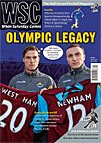 Steve Menary describes the row ensuing between British and French broadcasters over Manchester United’s Champions League tie against Marseille
Steve Menary describes the row ensuing between British and French broadcasters over Manchester United’s Champions League tie against Marseille
Anyone hoping to listen to the second leg of Manchester United’s Champions League tie with Olympique de Marseille on French radio is in for a disappointment. In a dispute that perhaps says a lot about the Premier League’s unwritten policy of never knowingly being undersold, French radio broadcasters plan to boycott the March 15 game at Old Trafford en masse.
The row started earlier this year, when five national radio stations – France Inter, Europe 1, RMC, RTL and Sud Radio – and around ten local stations asked United for media accreditation for the second leg and were stunned to find out that would cost €25,000 (£21,000) plus another €1,000 for “technical expenses”. French radio journalists encountered similar problems during the 2007 rugby union World Cup, which was mostly staged in France. After protests from the French media, the organisers capitulated but United refused to do the same this time.
For small French radio stations already paying to send a journalist from France to Old Trafford, this extra cost can be significant. The European Broadcasting Union and Marseille raised the issue with UEFA but this produced no concessions. So in February, Yannis Daras, head of the European Union of Sports Press (UEPS), wrote to Michel Platini asking the UEFA president to intervene.
“This request goes contrary to the right of information such as it was defined in Europe, such as it has been confirmed by decisions of the European Court of Justice and such as it was reinforced by French law during the last rugby World Cup in France,” wrote Daras. “One has to understand that especially during this period of European financial crisis it is very difficult for any radio station to pay such sums as asked for by Manchester United.”
UEFA disagreed, highlighting annex VII, article four of the 2009-10 Champions League regulations, which allows clubs to nominate two radio stations per season that then only have to pay the €1,000 technical fee. United has deals with Radio 5 Live and Talksport, and radio stations that are not among a club’s two official “partners” must pay €25,000. Marseille did not charge British radio stations for access to cover the dreary first-leg stalemate in France due to the post 2007 rugby World Cup deal struck with the French media.
The latest dispute was even brought up at the recent European Union Media Forum in Budapest, where Androulla Vassiliou, the commissioner for education, culture, multilingualism and youth – a mammoth brief also including sport – was asked to comment by the UEPS. “It’s a financial proposition, there’s nothing we can do,” said Ms Vassiliou.
What is at issue is differing approaches in England and France both to free speech and the value of commercial rights. Jean-Paul Savart, a French journalist and the UEPS member responsible for French radio, describes as “incredible” United’s attempt to charge for media access. “If Man Utd don’t stop this, UJSF [the French journalists’ union] will go in front of the European Court of Justice and no one [from] French radio goes to Manchester,” seethes Savart.
United are unwavering in the face of these judicial threats. “French radio stations are used to being able to access French grounds for free, and as a consequence, they don’t see that there is any commercial value attached to [Champions League] radio rights,” explains United’s director of communications, Phil Townsend. “The rates quoted to the French stations are competitive with the rights fees paid by UK stations and it would be unprofessional of us to offer a “special rate” to them. UEFA allows clubs to charge for live broadcast of radio matches, it is just that Marseille choose not to do so, which is their right.”
Making the French media a special case ahead of broadcasters in other European countries would surely only provoke a tidal wave of similar claims. A precedent would have been set that undermines the commercial value of sport, something that United, UEFA and the EU are unlikely to ever let occur. How then would clubs be able to pay players’ wages?
From WSC 290 April 2011